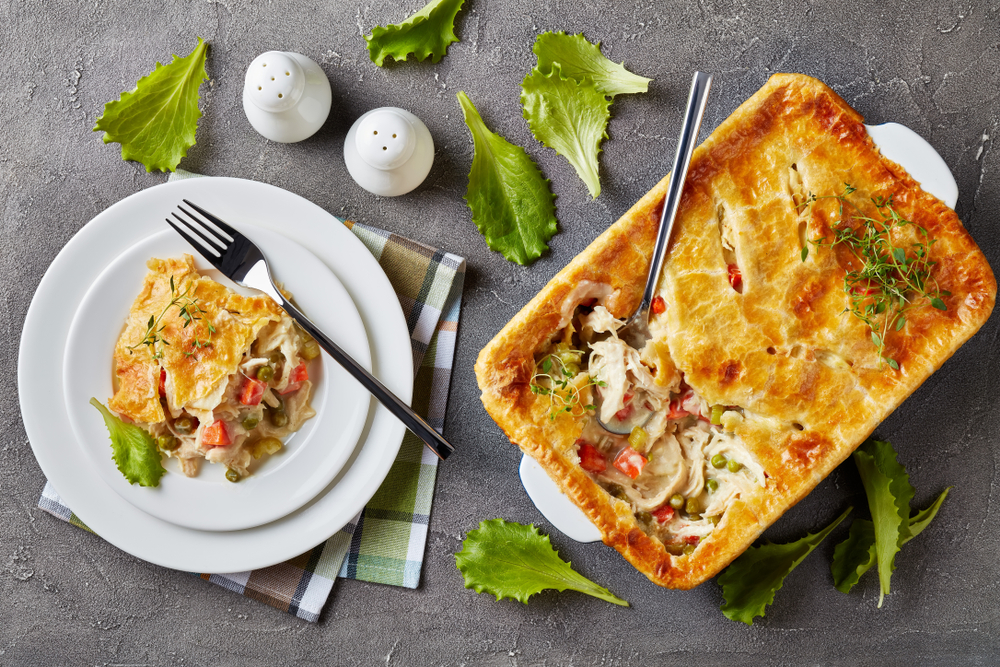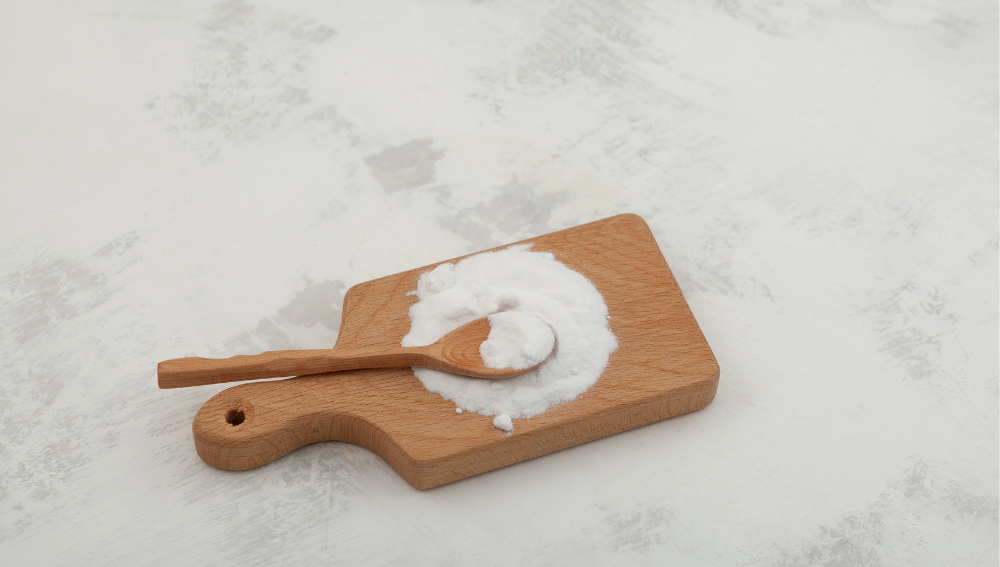Garlic bread is a popular side dish that is often served at Italian restaurants and pizzerias. It is made by spreading garlic butter on slices of bread and then toasting or baking it in the oven.
While garlic bread is undoubtedly delicious, many people wonder if it is good for their health. In this article, I will explore the nutritional value of garlic bread and answer the question: is garlic bread good for you?
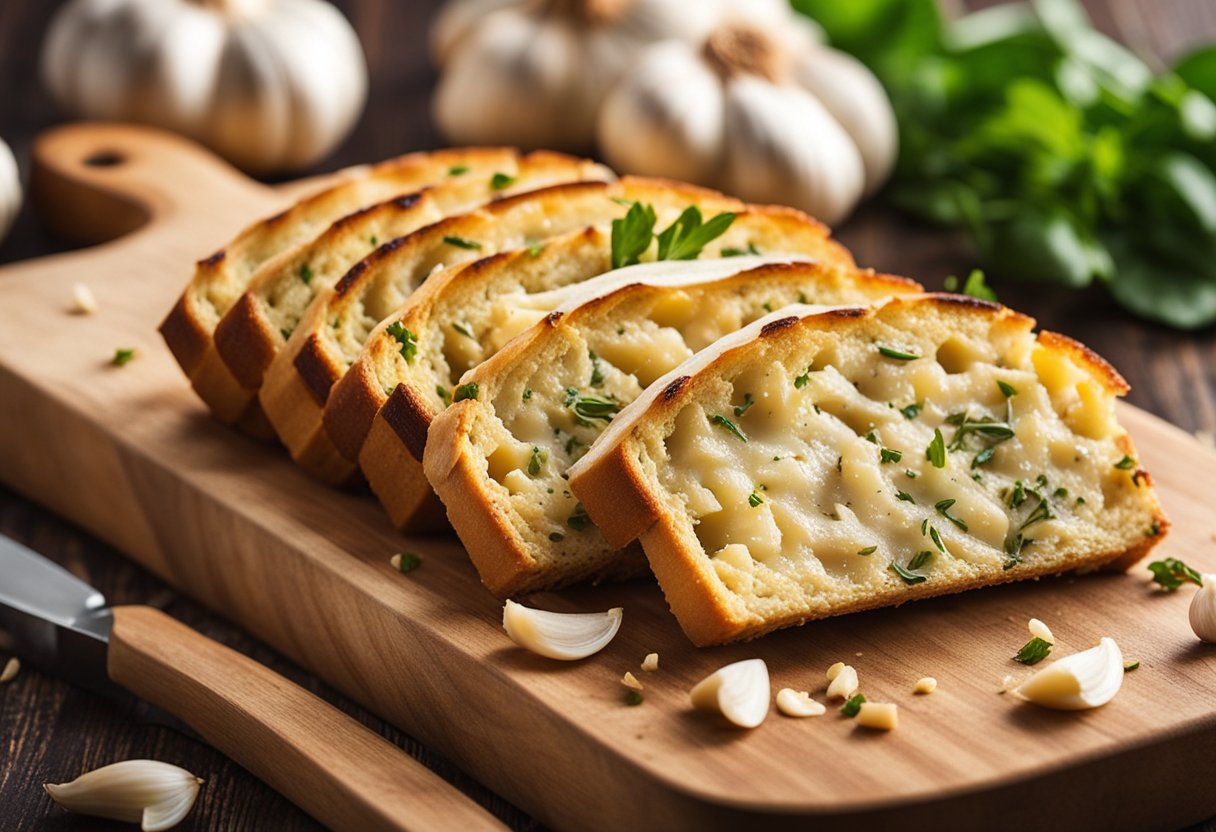
Garlic bread is a simple dish that consists of bread, garlic, and butter. While it may not be the healthiest food option, it does have some nutritional value.
Garlic, for example, is known for its many health benefits. It is high in antioxidants, which can help to reduce inflammation in the body.
Garlic is also believed to have antibacterial and antiviral properties, which can help to boost the immune system. Butter, on the other hand, is high in saturated fat, which can increase cholesterol levels and contribute to heart disease.
However, it is possible to make garlic bread with healthier ingredients, such as whole-grain bread and olive oil, which can provide additional nutritional benefits.
Key Takeaways
- Garlic bread can be a tasty and satisfying side dish, but it may not be the healthiest option.
- Garlic, which is a key ingredient in garlic bread, has many health benefits, including reducing inflammation and boosting the immune system.
- To make garlic bread healthier, consider using whole-grain bread and olive oil instead of white bread and butter.
The Basics of Garlic Bread
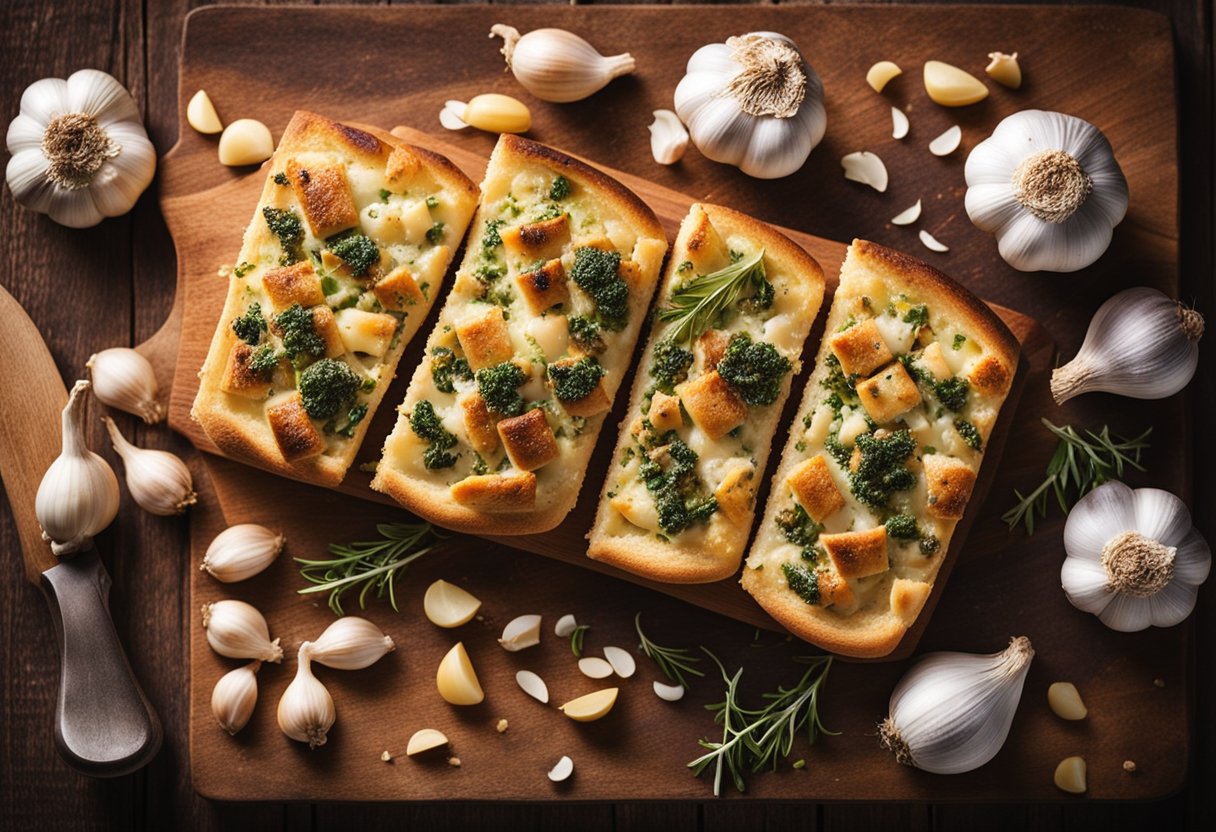
Garlic bread is a classic side dish that can complement almost any meal. It is made by spreading garlic-infused butter on slices of bread and then toasting or baking until crispy.
The bread used can be any type of bread, but a crusty Italian or French bread is often used for its texture and ability to hold up to the buttery garlic spread.
The key ingredients in garlic bread are garlic, butter, and bread. Garlic is a member of the onion family and has been used for both culinary and medicinal purposes for centuries.
It is known for its pungent aroma and flavor, which can be both sweet and savory depending on how it is prepared. Butter, whether salted or unsalted, is used to give the bread a rich and creamy texture.
The bread used can vary, but a crusty bread is preferred as it can hold up to the buttery spread and provide a satisfying crunch.
To make garlic bread, the garlic is minced and mixed with softened butter and chopped parsley. The mixture is then spread generously onto slices of bread and baked or toasted until crispy.
The bread can be sliced or left whole, depending on personal preference.
Garlic bread can be enjoyed on its own or served alongside pasta dishes, soups, or salads. It is a versatile side dish that is easy to make and can be customized to suit individual tastes.
Whether you prefer a light garlic flavor or a bold and intense garlic taste, garlic bread is a delicious addition to any meal.
Nutritional Value
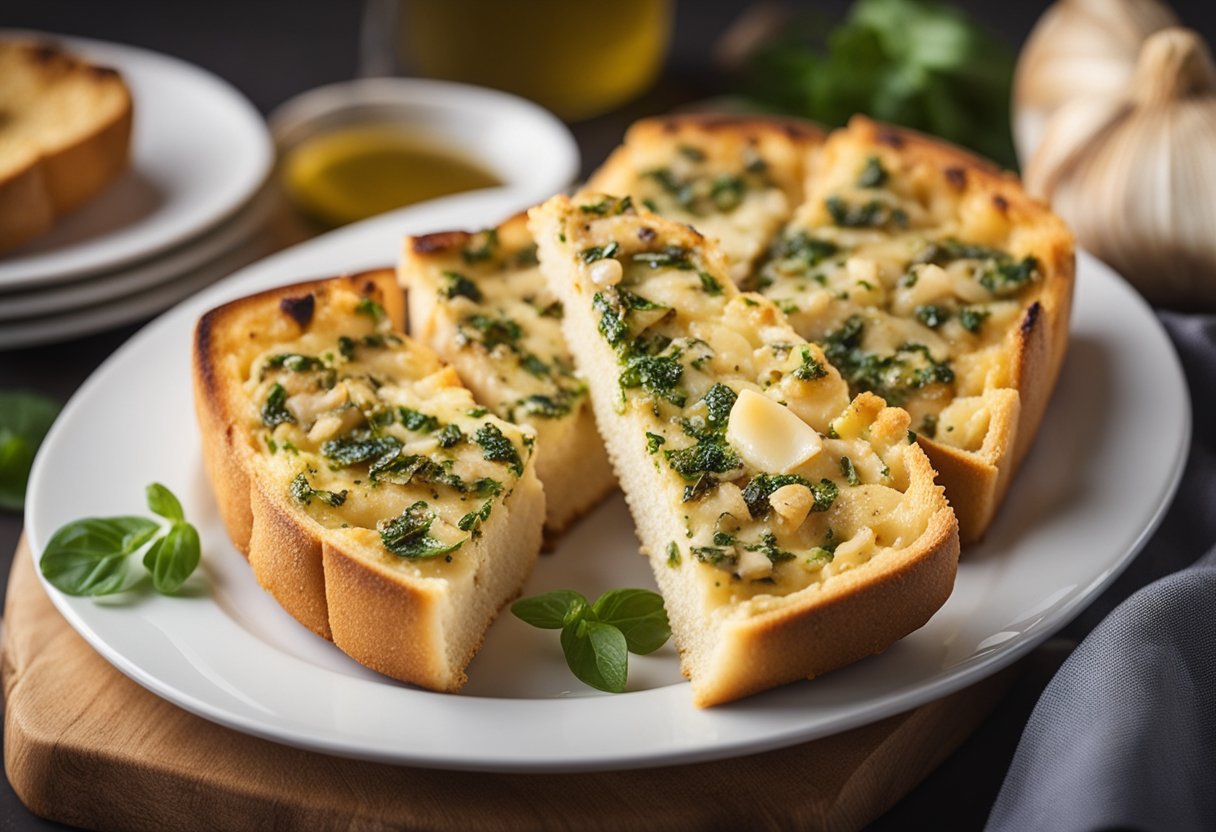
As a lover of garlic bread, I was curious to know its nutritional value. So, I did some research to find out if it’s good for me or not. Here’s what I found.
Nutrition Facts
According to the nutrition facts from FatSecret, a small slice of garlic bread (2-1/2″ x 2″ x 1″) contains 53 calories, 2.04g of total fat, 7.3g of total carbohydrates, and 0mg of cholesterol. It also contains 98mg of sodium, which is 4% of the recommended daily intake.
Protein
Garlic bread is not a significant source of protein. A medium slice of garlic bread (43g) contains only 3.6g of protein, according to Nutritionix.
However, if you pair garlic bread with a protein-rich dish, it can contribute to your overall protein intake.
Fiber
Garlic bread is not a good source of fiber. A medium slice of garlic bread (43g) contains only 1.1g of fiber, according to Nutritionix. However, if you use whole-grain bread to make garlic bread, it can increase the fiber content.
Nutrition
Garlic bread contains some important nutrients. Garlic is known for its health benefits, such as boosting the immune system and reducing the risk of heart disease.
However, garlic bread also contains a significant amount of sodium, which can increase blood pressure and the risk of heart disease. Therefore, it’s important to consume garlic bread in moderation.
In conclusion, garlic bread is not a significant source of protein or fiber, but it does contain some important nutrients. It’s important to consume garlic bread in moderation due to its high sodium content.
Making Garlic Bread at Home
I love making homemade garlic bread. It’s a simple and delicious way to add some flavor to any meal. Plus, it’s much healthier than store-bought garlic bread, which is often loaded with preservatives and artificial ingredients.
To make homemade garlic bread, you’ll need a few basic ingredients: bread, butter or olive oil, and garlic. You can use any type of bread you like, but I prefer a crusty French or Italian bread. Baguettes work great too!
To start, preheat your oven to 350°F (175°C). Cut the bread into slices, but be careful not to cut all the way through the bottom. You want the slices to stay attached to the loaf.
Next, mix together some softened butter or olive oil with minced garlic, finely chopped fresh parsley, and a pinch of kosher salt. Spread the mixture generously between each slice of bread, making sure to get it all the way down to the bottom.
If you want to get creative, you can also add other herbs and seasonings to the butter mixture. Some of my favorites include Italian seasoning, oregano, chives, and grated Parmesan cheese.
Once the bread is coated in the garlic butter mixture, wrap it in foil and place it on a baking sheet. Bake for 10-15 minutes, or until the bread is crispy and golden brown.
If you want to add some extra flavor and texture, you can also sprinkle some shredded mozzarella cheese on top of the bread during the last few minutes of baking.
Homemade garlic bread is a delicious and easy side dish that pairs well with just about any meal. Plus, it’s a great way to use up leftover bread before it goes stale.
Give it a try and see how easy it is to make your own garlic bread at home!
Storing and Reheating Garlic Bread
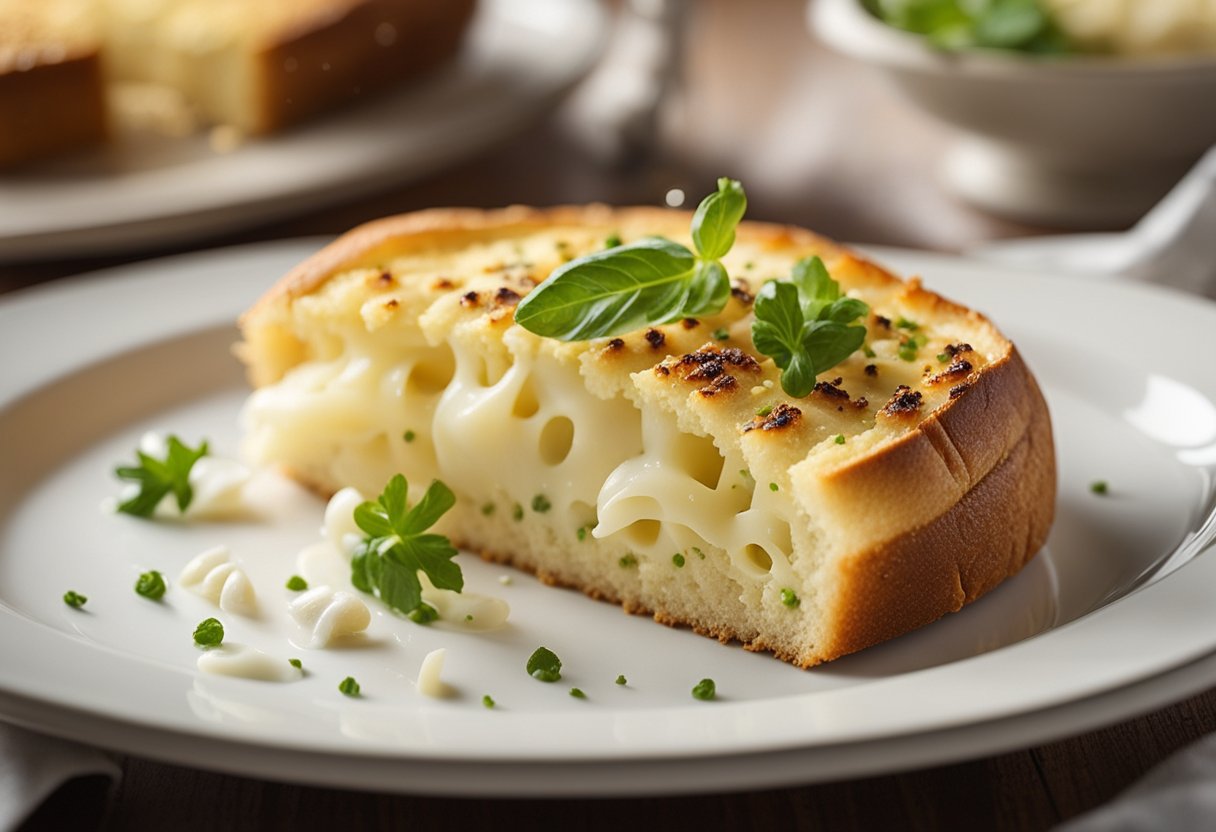
As a garlic bread lover, I always make more than I need. So, what to do with the leftovers? Storing garlic bread properly is important to maintain its flavor and texture. Here are some tips on how to store and reheat garlic bread.
Storing Garlic Bread
When storing garlic bread, it’s best to keep it at room temperature. Avoid putting it in the fridge as it can dry out the bread and make it hard.
Instead, wrap the bread in aluminum foil or store it in an airtight container. This will help keep the bread fresh for up to two days.
If you have leftover garlic bread that you won’t eat within two days, you can freeze it. Wrap the bread in aluminum foil or plastic wrap and put it in a freezer-safe container. This will keep the bread fresh for up to a month.
Reheating Garlic Bread
Reheating garlic bread is easy, and there are several ways to do it. The best way to reheat garlic bread is in the oven.
Preheat the oven to 350°F (175°C) and wrap the bread in aluminum foil. Place the bread on a baking sheet or wire rack and leave it in the oven for 10 to 15 minutes, depending on the size of the loaf or slices.
This will make the bread crispy and warm, just like it was freshly baked.
If you’re short on time, you can also reheat garlic bread in the microwave. Wrap the bread in a damp paper towel and microwave it for 15 to 20 seconds.
This will make the bread warm, but it won’t be as crispy as oven-baked garlic bread.
In summary, storing and reheating garlic bread is easy if you follow these tips. Keep the bread at room temperature, wrap it in aluminum foil or store it in an airtight container, and reheat it in the oven for crispy and warm garlic bread.
Garlic Bread as a Side Dish
As a lover of all things garlic, I often find myself reaching for a slice of garlic bread to accompany my meals. But is garlic bread actually a healthy choice as a side dish? Let’s take a closer look.
Nutritional Information
A typical serving of garlic bread contains around 150-200 calories, depending on the size and type of bread used. It also contains a moderate amount of fat and carbohydrates, with very little protein or fiber.
While garlic itself is known for its potential health benefits, such as reducing inflammation and boosting immune function, the amount of garlic in garlic bread is usually quite small and unlikely to provide significant health benefits on its own.
Pairing with Main Dishes
Garlic bread is a popular side dish for a variety of main courses, from spaghetti and meatballs to steak and pizza. While it can be a delicious addition to a meal, it’s important to consider the overall nutritional profile of the meal.
If you’re pairing garlic bread with a carb-heavy main dish like spaghetti or lasagna, you may want to opt for a smaller serving of garlic bread to avoid overloading on carbohydrates.
On the other hand, if you’re pairing it with a protein-rich dish like chicken or broiled meat, the added carbohydrates from the bread may actually be beneficial for providing energy.
Healthier Alternatives
If you’re looking for a healthier alternative to traditional garlic bread, there are a few options to consider. One is to use whole grain bread instead of white bread, which will provide more fiber and nutrients.
Another option is to use a garlic-infused olive oil instead of butter, which will provide healthy fats and antioxidants.
You could also consider serving a side dish that incorporates garlic, such as a cauliflower soup or a garlic roasted vegetable dish.
These options will provide more nutrients and fiber than traditional garlic bread, while still satisfying your craving for garlic flavor.
Overall, while garlic bread may not be the healthiest side dish option, it can certainly be enjoyed in moderation as part of a balanced diet.
Variations of Garlic Bread
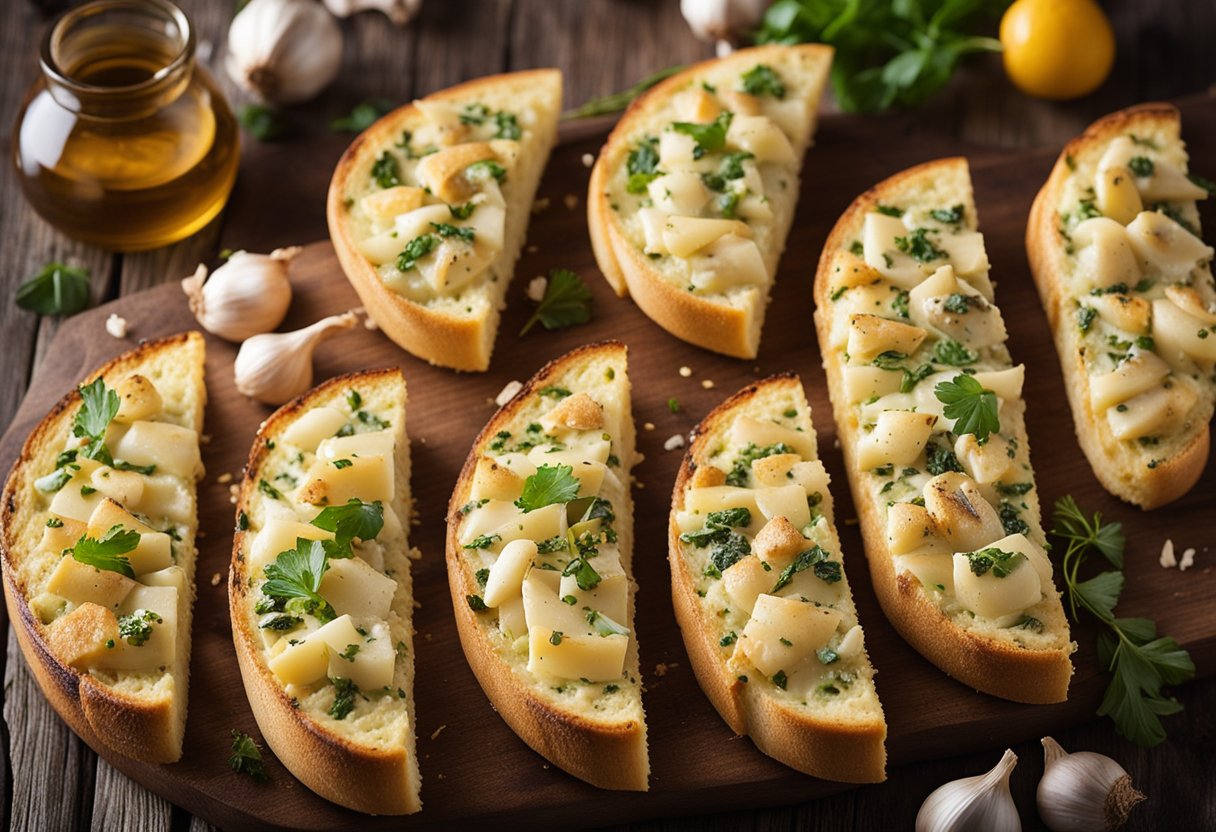
Garlic bread is a classic side dish that can be found in many cuisines around the world. It is a simple and delicious way to add flavor to any meal.
While the basic recipe involves bread, butter, and garlic, there are many variations that can be made to suit different tastes.
One popular variation is adding parmesan cheese to the garlic butter spread. This adds a salty and nutty flavor to the bread that pairs well with pasta dishes.
Another option is to serve garlic bread with marinara sauce for dipping. The combination of garlic bread and marinara sauce is a classic pairing that is sure to please.
For those who love cheese, there are many ways to add it to garlic bread. Shredded mozzarella can be added to the garlic butter spread for a gooey and cheesy treat. Cheddar cheese can also be used for a sharper flavor.
If you prefer a softer garlic bread, try using a French baguette instead of a traditional loaf. The crust is thinner, and the bread is fluffier, making it a perfect choice for a lighter garlic bread.
In summary, there are many variations of garlic bread that can be made to suit different tastes.
Adding parmesan cheese, serving with marinara sauce, adding shredded mozzarella or cheddar cheese, and using a French baguette are just a few examples of the many ways to make garlic bread.
Frequently Asked Questions
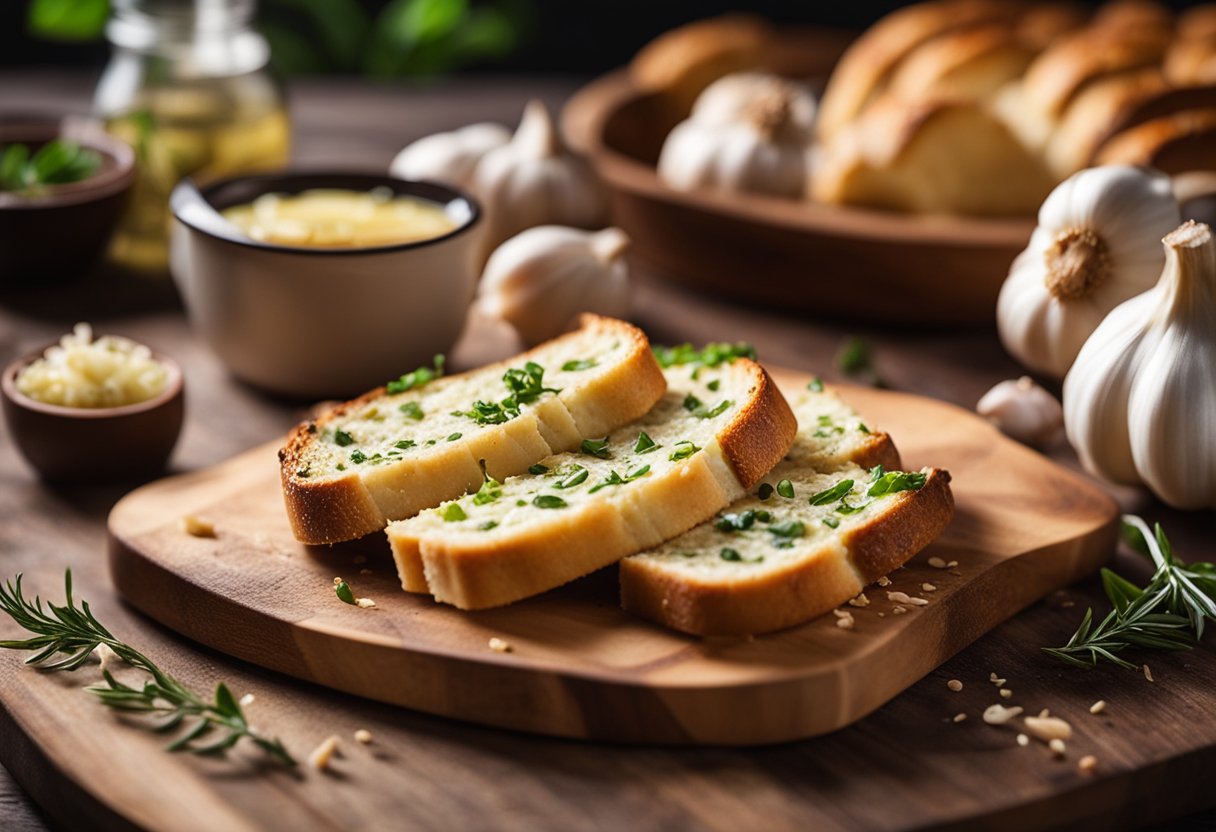
Is garlic bread bad for your health?
Garlic bread can be unhealthy if consumed in excess or made with unhealthy ingredients, such as refined flour and excessive amounts of butter or oil.
These ingredients can contribute to weight gain, high cholesterol levels, and other health problems. However, garlic itself has several health benefits, such as boosting the immune system and reducing inflammation.
Can garlic bread be part of a healthy diet?
Yes, garlic bread can be part of a healthy diet if made with whole-grain bread, minimal butter or oil, and fresh garlic.
Whole-grain bread contains fiber and other nutrients that are beneficial to health, while fresh garlic has numerous health benefits. However, it is important to consume garlic bread in moderation as part of a balanced diet.
Is garlic bread a good source of nutrients?
Garlic bread is not a significant source of nutrients, but it does contain some vitamins and minerals. For example, garlic contains vitamin C, vitamin B6, and manganese.
Whole-grain bread also contains fiber, which is important for digestive health.
Is garlic bread suitable for people with diabetes?
Garlic bread can be high in carbohydrates, which can cause blood sugar levels to spike in people with diabetes. However, whole-grain bread and fresh garlic can be included in a diabetes-friendly diet in moderation.
It is important to consult with a healthcare provider or registered dietitian to determine the appropriate portion sizes and frequency of consumption.
Is garlic bread vegan-friendly?
Garlic bread can be vegan-friendly if made with plant-based ingredients, such as whole-grain bread and vegan butter or oil.
However, some garlic bread recipes may contain animal-derived ingredients, such as butter or cheese, so it is important to check the ingredients list or ask the chef or baker.
Is garlic bread high in calories compared to other foods?
Garlic bread can be high in calories compared to some other foods, especially if made with excessive amounts of butter or oil.
However, it can still be part of a healthy diet if consumed in moderation as part of a balanced meal. It is important to pay attention to portion sizes and choose healthier ingredients when possible.




